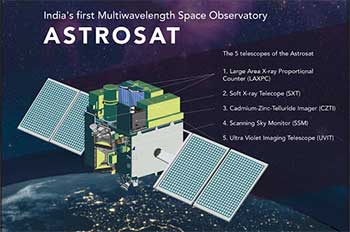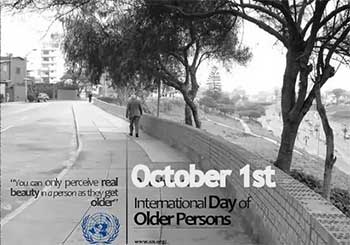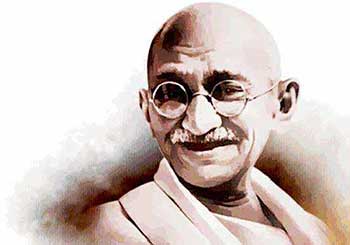Extreme UV light from galaxy detected by AstroSat can give important clue on Dark ages: DST
In News
- India’s first multi- wavelength satellite AstroSat has detected extreme UV (EUV) light from a galaxy 9.3 billion- light years away from earth, uncovering an important clue on how the dark ages of the Universe ended and how the first extreme- UV light appeared, the DST said on Thursday.

About
- India’s first multi-wavelength satellite, AstroSat, has detected extreme-UV (EUV) light from a galaxy, called AUDFs01, 9.3 billion light-years away from earth.
- A bilateral organization, CEFIPRA (Centre for the Promotion of Advanced Research) set up by the DST and the Ministry of Europe and Foreign Affairs of France – delved into how galaxies like AUDFs01 grow their stellar mass when the first stars and galaxies become visible.
- A team consisting of Professors from Laboratory for studies of Radiation and Matter in Astrophysics and Atmospheres (LERMA), France and Inter- University centre for Astronomy and Astrophysics (IUCAA), India connected by CEFIPRA estimated the recent star formation rate and mass of the gas reservoir in the galaxy.
- The multi-wavelength satellite AstroSat, which was launched on September 28, 2015, by the Indian Space Research Organization (ISRO) has five unique X-ray and ultraviolet telescopes working in tandem and has onboard the ultraviolet imaging telescope (UVIT).
International Day of Older Persons, Decade of Healthy Ageing (2020-2030) & Longitudinal Aging Study in India (LASI)
Why in NEWS ?
- Every year 1st October is celebrated as the International Day of Older Persons, as declared by United Nations.

About
- This is to recognize, enable and expand the contributions of older people in their families, communities and societies.
- The event acknowledges to raise awareness towards issues of ageing.
- The year 2020 marks the 75th Anniversary of the United Nations.
- This is also 30th Anniversary of the International Day of Older Persons.
- This year has also seen an emergence of COVID-19, that has caused an upheaval across the world.
- The higher risks confronted by older persons during the outbreak of pandemics such as COVID-19 is worrying.
- Recognizing older persons contributions to their own health and the multiple roles they play in the preparedness is important.
- This year has also been recognised as the “Year of the Nurse and Midwife”.
- International Day of Older Persons 2020 will highlight the role of the health care workforce in contributing to the health of older persons.
DECADE OF HEALTHY AGEING (2020-2030)
- October 1 st , 2020 is also the launch year of Decade of Healthy Ageing (2020-2030).
- The broad aims of the Decade of Healthy Ageing will include evolving convergence within various national health programs aimed at mainstreaming issues related to elderly.
- This will deliberate upon ways to ensure better and effective delivery of services, making full use of convergence mechanisms.
- This initiative is an opportunity to bring together governments, civil society and all the stakeholders to improve the lives of older people, their families, and the communities in which they live.
- The programs will also be promoted at an inter-sectoral coordination with other line Departments/Ministries.
- Community based organisations, NGOs etc. will also be involved in building a framework for multi-sectoral engagement on healthy aging.
- Discussions/workshops/webinars with experts/academic bodies/professionals will be organised to bring out a policy.
Longitudinal Aging Study in India (LASI)
- A programmatic response to LASI, highlighting the best practices for elder care will be followed.
- It will also help in exploring effective means of participation of older persons in various aspects of social, cultural, economic and civic and political life.
- Longitudinal Aging Study of India, the first nationwide study and world’s largest study on older adults.
- It will provide evidence base for national and state level programs and policies for elderly population.
- UN theme of the International Day of Older Persons 2020 is “Pandemics: Do They Change How We Address Age and Ageing?”
Gandhi Jayanti 2020
Context
- Mohandas Karamchand Gandhi or Mahatma Gandhi was born on October 2, 1869, in Porbandar, Gujarat. This year will mark Gandhi’s 151st birth anniversary.

About
- Gandhi Jayanti is celebrated on October 2 every year to mark the birth anniversary of Mahatma Gandhi.
- He was born on October 2, 1869, at Porbandar in Gujarat.
- He was an Indian lawyer, politician, social activist, and writer who led the independence movement against British rule.
- And during this process, people started to call him the father of the nation (Bappu). Mahatma Gandhi died on January 30, 1948.
- 2 nd October is observed across states and territories in India, and is one of the officially declared national holidays.
Significance of this day
- On this day, people celebrate with prayer services, commemorative ceremonies and cultural events that are held in colleges, local government institutions and socio- political institutions.
- The statues of Mahatma Gandhi are decorated with garlands and flowers.
- His favourite song Raghupati Raghava is also sung at some of the meetings.
- His birth anniversary is celebrated in other parts of the world too.
- Meanwhile, the President and Prime Minister of India usually pay homage at Raj Ghat, the Samadhi of Mahatma Gandhi in New Delhi.
Gandhi’s Major Contribution
- People honour Gandhi’s contributions towards the Indian Independence movement, and his non-violent way of life.
- He led the Dandi Salt March in 1930.
- In 1942, he launched the Quit India Movement.
- He was also instrumental in abolishing the age-old practice of untouchability.
International Day of Non-Violence
- On June 15, 2007, the UN General Assembly adopted a resolution that declared October 2 as International Day of Non-Violence.
- The resolution reaffirms “the universal relevance of the principle of non-violence” and the desire “to secure a culture of peace, tolerance, understanding and non- violence”.







